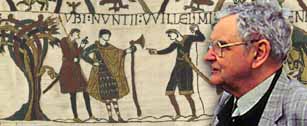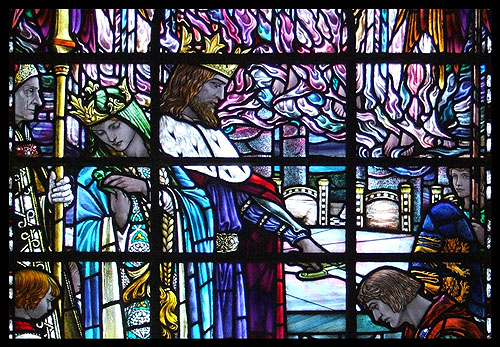 |
 |
|||
|
|
If the name of King Arthur is mentioned, I suppose what comes to mind is not so much one person as a whole array of characters and themes, a montage so to speak. Of course, we do think first of the King, the magnificent monarch of a glorified or idealized medieval realm. But we think also of his queen, of the fair and wayward Guinevere, we think of his enchanter, Merlin, who presided over his birth, who set him on the throne, who established him there in the early and travelled days of his reign. There were the Knights of the Round Table, vowed to the highest ideals of chivalry, and the greatest of them, Sir Lancelot, who, of course, has a tragic love affair with the Queen. There is another great love story, that of Tristan and Isolde, the theme of Wagner's Opera.
We think of the place where these people assembled, Camelot, Arthur's magnificent, personal castle and capital and then, there are stranger things; the story of the quest for the Holy Grail, giving a spiritual dimension to the whole story; and there is magic. Not only the magic of Merlin but the magic also of his strange, ambiguous student, the woman, the enchantress, Morgan Le Fay. And at the end is the tragedy of Arthur's downfall, his passing away at the Isle of Avalon and another mystery that we do not know what really happened to him that he was said to be immortal, that one day he would return and restore the golden age in his country.
Now, of course, this is all a realm of the imagination conceived by great authors in the Middle Ages and put in medieval garb. But perhaps few people realize what a very great realm of the imagination it is, how vast a literature this has been. In the Middle Ages this was the great theme of creative writing in poetry and prose. Not only in England, but pre-eminently in France and in Germany there were romances of Arthur. In fact, in every language of Christendom at that time.
I suppose, the version we know best is the one that was composed in the 15th century. This is the great English version of the story, compiled out of earlier versions by the creative genius of a rather mysterious and cryptic figure, the knight, Sir Thomas Malory. But the story doesn't end there. The whole thing revives in the time of Queen Victoria, with Tennyson's "Idylls of the King." As a result of this great work on the Arthurian Cycle by England's Poet Laureate, the story became known to everybody.
Other poems, novels and plays in our own time, and almost a rebirth of it yet again in T. H. White's novels, "The Sword and the Stone" and "The Once and Future King" and other plays and musicals and films based on these works. There are Rosemary Sutcliff, Mary Stewart, Marian Bradley, Pat Godwin and others, who have gone off on another line and tried to imagine the Britain of King Arthur as it might really have been.
What I have personally been most concerned with is the background of all this, and the question, "where did it come from originally?" It's a very obvious thing to ask the straight question, "did King Arthur exist?" And, in fact, you cannot give a straight answer to that question; yes and no are both wrong. There were other great historical figures who became the heroes of medieval legends, such as Alexander the Great and Charlemagne. We know that they existed and if somebody asks whether they did, we can say "yes" directly because we have reliable, historical records of them. But with Arthur, it is rather more difficult because the emphasis really is all on the legend, the romance.
If we say "yes," that would imply that this magnificent medieval monarch existed and reigned, at some time or other, in his glorified medieval court as described as by Malory, Tennyson and the romances. Of course, he didn't. There is no such person as King Arthur, in that sense; it's quite an impossible idea. So we cannot say "yes," directly, but to say "no" is also misleading because that implies that he is completely fictitious, that he was all made up in the Middle Ages when these stories were first told, and that there is no sort of background or original person behind the stories, at all. That, too, is misleading. This is a puzzle, a very difficult question.
The main reason is that writers of fiction in the Middle Ages, when they were dealing with something handed down to them from a distant past, didn't approach it as a modern historical novelist does. Historical novelists, nowadays, will aim at authenticity. They will try to get things right and will do research to discover how people dressed in the time they are writing of, what houses they lived in, what food they took, what interests they had, what kind of business or work they engaged in ... they will try to get the period right. Medieval authors did not do this. When they were dealing with a story that had been handed down from some distant time, they updated everything. If you look at medieval paintings of scenes from the Bible, for example, they don't look as they really would have looked; you'll see little castles in the background and things of that kind. The authors who wrote about King Arthur were aiming at a particular kind of audience, very largely an upper class, aristocratic audience or the wealthier middle classes who could read, but certainly not the people generally. They considered what their audiences liked and what they were interested in, so they wrote stories about the current interests of the aristocracy; stories of chivalry, of tournaments, of courtly love and heraldry. They dressed the knights up in elaborate medieval armor, they had them worship in medieval cathedrals, and so forth. So, the whole story of King Arthur becomes something that is put into the Middle Ages even if it doesn't really belong there.
Now these authors and their audiences knew that the story of King Arthur was something that had been handed down from a much earlier time. We can be sure of that because we can trace it, to some extent, being handed down. Certainly, the people of the Middle Ages, on the one hand, realized that it was an old story, that it was set a long way back, but on the whole, they didn't really care very much about getting it right.
I would feel that a medieval author or medieval reader of stories of Arthur took rather the same attitude to his Britain, to his supposed kingdom, as we nowadays take to the Wild West. On the one hand, we know that for perhaps 30 or 40 years during the latter part of the 19th century, the American West was wild. There were sheriffs and outlaws and gunfights. Some of the characters were real people; Billy the Kid existed, Calamity Jane existed, and so forth. But, unless we have a special interest in the history of those times, we probably don't care very much about absolute accuracy.
We know that the Wild West is a realm of the imagination. It was created, first, by novelists such as Owen Wister and Zane Grey. It was then taken up by Hollywood, and it was taken up, later, by the makers of television series. We now recognise the Wild West of the movies as a realm of the imagination where certain kinds of adventure happen. Some of the people who appear in these adventures may be based on real people, Billy the Kid, for instance. But at the same time, we don't really care very much unless we have a special historical interest, and I would say that most readers and writers in the Middle Ages took rather this view of King Arthur and his Britain.
On the one hand, Arthur's Britain was understood by medieval readers as a country of the imagination where certain kinds of adventures happened. On the other hand, they knew that there was some reality behind it (just as there is a reality behind the Wild West), but, they did not know just when the stories actually took place, only that it was somewhere back in time.
Now if we look at the writers and film makers in our own time who have taken up this story, we find that some have more or less gone along with the medieval image and some have recreated it in their own way. T. H. White, for example, derided the whole idea of any sort of history behind the Arthurian legends. He didn't care about the reality. It was just a great medieval story and he retold it in his own way. White, somewhere, speaks of people who had speculated about a real, historical Arthur and says contemptuously that "Arthur was not a distressed, ancient Briton hopping about in a suit of woad in the 5th century."
But, of course, others have faced this distressed ancient Briton without any loss of creativity. They have tried to imagine Arthur's Britain in the 5th or 6th century, more or less as it might have been, and to put the characters in their real settings. Rosemary Sutcliff did this, for example, in "Sword at Sunset" and Mary Stewart did it in her novels of Merlin. You can do it in all sorts of ways and sometimes this does provide some rather surprising insights.
One of the most astute questions that anybody ever put to me about this was put by a student who said he had seen three films about the Arthurian theme. He said he had seen the musical "Camelot" and he had a seen a French film about the Legend of Sir Lancelot and he had seen "Monty Python and the Holy Grail." Now, he asked me, which I thought was most like the real thing? I said without hesitation, "Monty Python and the Holy Grail," and indeed it is, this atmosphere of sloshing about in mud, struggling through forests, not being quite sure what is around the next corner. Britain, in the Dark Ages of Arthur, was probably a good deal more like that than the resplendent kingdom that we see in a film like "Camelot" or "First Knight."
Well, of course, you may say I've been rather begging the question here: What was the real setting? And the modern novelists I've spoken of, have been moved to their work partly by the fact that there is a very slowly growing awareness of what it was and when it was, through historical study and through the work of archaeologists. And if we look at that period we can ask, and I think this is a better way of putting the question, not did King Arthur exist, but how did this legend originate, what fact(s) is it rooted in?
Then, of course, we must ask what period? Well, the medieval writers with all their fancy did know, more or less, that they were being a bit vague. They don't give us many real dates but they place King Arthur somewhere in the period from about AD 450 to AD 550. That, of course, is longer than any one man could have reigned, but they see him as living somewhere about that time, and they were right. This, in fact, is where the story we know began its career, but the foundations for the medieval romances had been laid a little before, in the old legends about Arthur.
Click here for an Introduction to Geoffrey Ashe. David Nash Ford was formerly history editor for the now defunct online British history magazine, britannia.com.
|
|||
| © Geoffrey Ashe 1995. All Rights Reserved. | ||||





 A Quest for Arthur:
A Quest for Arthur: